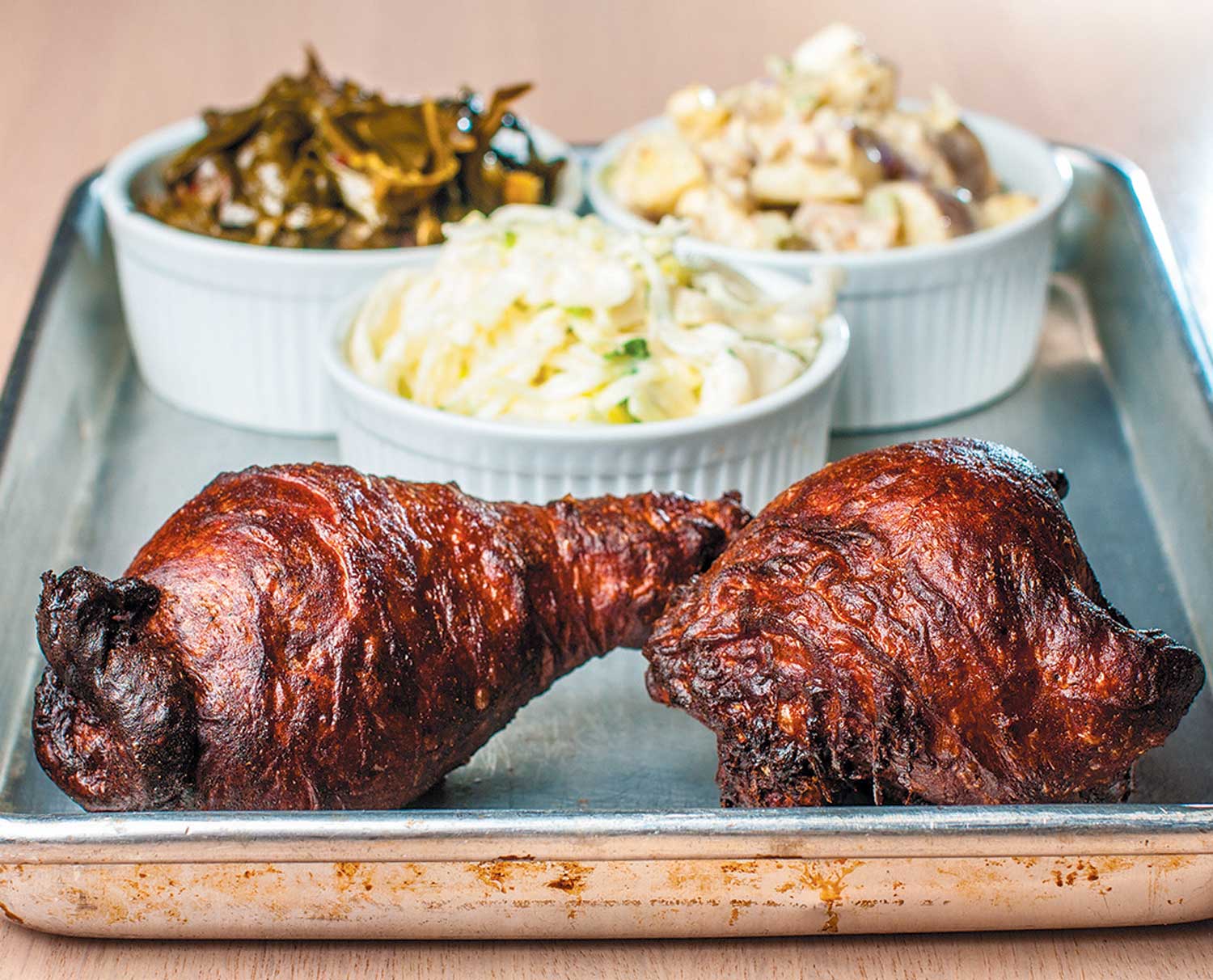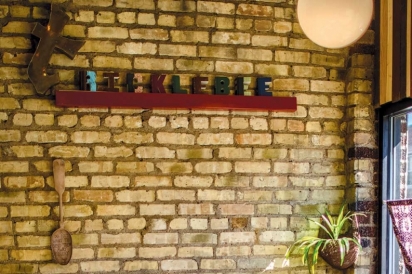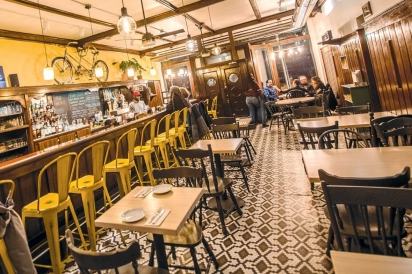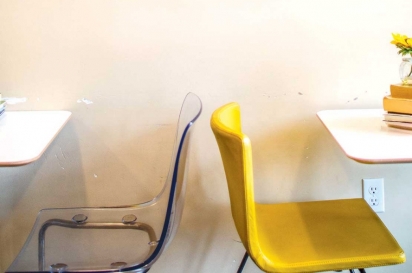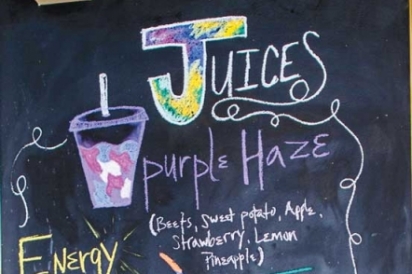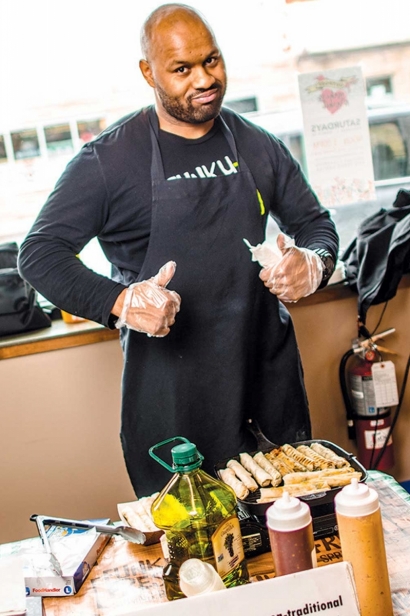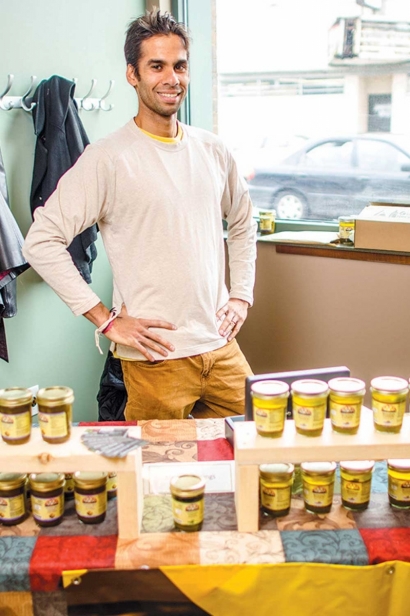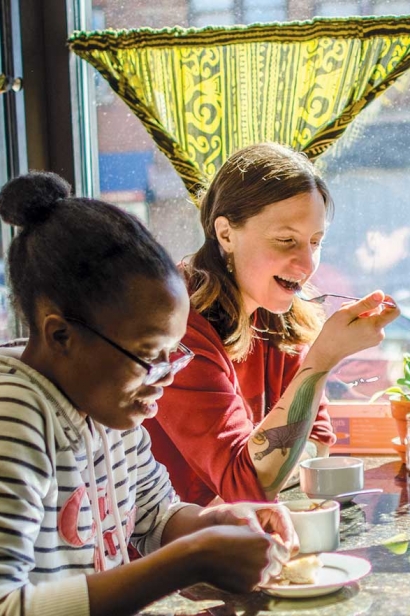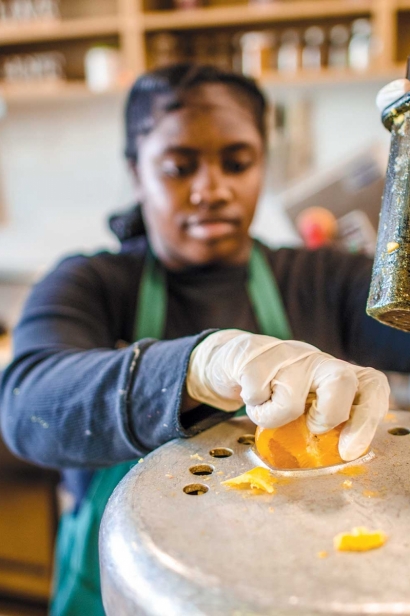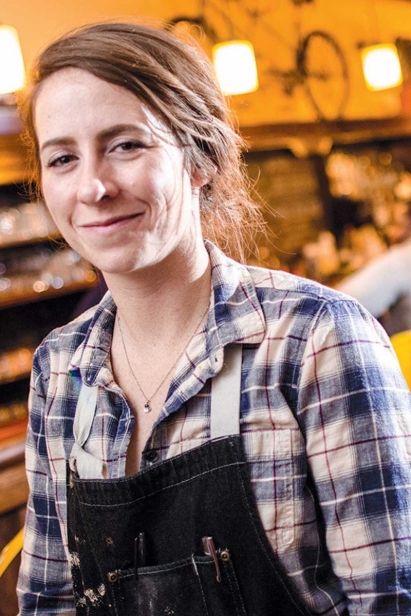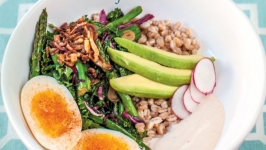Lessons in Revitalization From Lindsay Heights and Sherman Park
It’s Saturday, early 2017. The sun is shining. TrueMan McGee is grilling a batch of vegan sweet potato and black bean Funky Fresh Spring Rolls inside the Outpost Learning and Event Center during a weekly Maker’s Market in Lindsay Heights.
At the table to his right, Mahesh Narayanawamy of Mooks Musings offers samples of freshly made Cilantro Coolie. Across the room, Angela Moragne and daughter Stevey Pitts, operating under the names That Salsa Lady and The Chip Chick, open a container of Urban Garden Salsa, made from tomatoes, peppers and herbs they grew three miles up the road at what they call “The Hood Ranch.”
A security guard wearing a Walnut Way jacket paces outside the market at 1617 West North Avenue. Other tenants in the building include The Juice Kitchen, a locally sourced juice company; a commercial kitchen for the Milwaukee Center for Independence; and Fondy Food Center offices. Developers call it The Innovations and Wellness Commons, and this food hub is only Phase I of a two-part effort to restore access to fresh food, job training and community programming to a neighborhood with notably high crime and poverty rates. Shortly after the completion of phase I, neighborhood stakeholders and residents continued to push forward with unbounded perseverance, propelling redevelopment projects designed to transform and sustain the health, safety and socioeconomic status of the community. At the core of these efforts is Walnut Way Conservation Corp.
Co-founded by residents Sharon and Larry Adams in 2000, Walnut Way brings neighbors together to turn aspirations into reality. The organization serves as a catalyst for projects that convert unoccupied lots into community gardens. They provide security to area hotspots, refurbish crumbling homes into suitable housing, and create wellness opportunities that offer employment and career development.
Restoring business to two former commercial corridors—North and Fond du Lac Avenues, where nearly 50 percent of storefronts are empty or barely used—is essential for revitalization. “Phase I of The Commons shows how a disinvested community can draw upon the inherent resilience, talent and passion of its residents and partners to reclaim economic power,” says Nancy Ketchman, communications consultant for Walnut Way. But leveraging local skills is just one of the lessons to be learned when transforming a community. Here are three more.
A security guard wearing a Walnut Way jacket paces outside the market at 1617 West North Avenue. Other tenants in the building include The Juice Kitchen, a locally sourced juice company; a commercial kitchen for the Milwaukee Center for Independence; and Fondy Food Center offices. Developers call it The Innovations and Wellness Commons, and this food hub is only Phase I of a two-part effort to restore access to fresh food, job training and community programming to a neighborhood with notably high crime and poverty rates. Shortly after the completion of phase I, neighborhood stakeholders and residents continued to push forward with unbounded perseverance, propelling redevelopment projects designed to transform and sustain the health, safety and socioeconomic status of the community. At the core of these efforts is Walnut Way Conservation Corp.
Co-founded by residents Sharon and Larry Adams in 2000, Walnut Way brings neighbors together to turn aspirations into reality. The organization serves as a catalyst for projects that convert unoccupied lots into community gardens. They provide security to area hotspots, refurbish crumbling homes into suitable housing, and create wellness opportunities that offer employment and career development.
Restoring business to two former commercial corridors—North and Fond du Lac Avenues, where nearly 50 percent of storefronts are empty or barely used—is essential for revitalization. “Phase I of The Commons shows how a disinvested community can draw upon the inherent resilience, talent and passion of its residents and partners to reclaim economic power,” says Nancy Ketchman, communications consultant for Walnut Way. But leveraging local skills is just one of the lessons to be learned when transforming a community. Here are three more.
Work in Tandem
It’s 2015. The dilapidated Wally Schmidt Tavern building sits vacant at 1848 West Fond du Lac Avenue. What used to be a welcoming gathering place for nearly a century has become a hopeless target for vandals. Lindsay Heights resident Jeremy Davis, an environmental specialist for Walnut Way, and Juli Kaufmann, real estate developer for Fix Development (the same company to work on The Commons), are on the scene. Their plan: to resurrect the venue with community camaraderie and sustainability as the nucleus for their business model.
The potential they see in the century-old building comes in the form of a fully restored sit-down restaurant on the first floor with affordable office space upstairs. The ideal dining tenant would employ neighborhood residents, offer on-the-job training, and source local ingredients when possible. Akin to the mission, Caitlin Cullen, a former educator and now, professional chef, emerges as the ideal candidate to open her restaurant concept—The Tandem— once renovations are complete.
It’s late 2016. Patrons pour through the door during the grand opening of the new restaurant. Hugs are exchanged among diners and staff, a security guard nods hello in the corner, drinks are lining up on the 100-year-old bar. The employees, many of whom live in the neighborhood and have never worked in a restaurant before, are bustling with energy. The opportunities are invaluable to the neighborhood.
It’s late 2015. Rev. Christie Melby-Gibbons eyes up the ramshackle space on the corner of 45th and North Avenue near Sherman Park. It’s been vacant for 10 years, but she’s picturing a place that would offer meals and spiritual nourishment for any patron, regardless of ability to pay. Remembering a phrase her mother said to her growing up, “the trick will be,” Rev. Melby-Gibbons signed the lease for what would become the Tricklebee Cafe.
It’s 2017. Her cafe is alive with patrons gathered around communal tables, sharing bowls of potato and cheese chili and vegan Waldorf salad. There are no prices on the chalkboard menu that highlights fresh baked goods along with soup and salad. The philosophy is simple: Pay what you can.
Customers may also sign up for volunteer shifts in exchange for meals and restaurant experience. “Volunteers get on-site training in food service and hospitality. They learn commercial kitchen sanitation practices, safe knife handling for chopping produce, baking skills, serving guests, bussing tables, dish washing, front-of-house skills and janitorial skills,” says Rev. Melby-Gibbons.
The trick is to bring individuals from all backgrounds around the concept of a community table, and to maintain a safe place for neighbors to convene. By providing access to healthy food, Trick- lebee Cafe operates under the vision that if people better care for themselves and their neighbors, the community will continue to heal and get stronger.
Prepare for Impact
“To date, Phase I tenants [of The Innovations and Wellness Commons] have created 19 jobs with benefits for local residents,” says Ketchman. “The impact of Phase I is also reflected in the more than $125 million in real estate developments in Lindsay Heights that was spurred by The Commons.” The Historic Walter Schmidt Tavern, where Ketchman’s office is located; the Social Development Commission office at 1730 West North Avenue, and the upcoming Blommer Ice Cream Co. at 1500-1504 West North Avenue are among those developments.
With plans to break ground this summer, Phase II of The Commons is currently underway. “The focus of Phase II is to activate the spirit of entrepreneurship, social activism and self-care that will continue our neighborhood’s amazing transformation into a healthy, vibrant and more prosperous neighborhood,” says Ketchman.
In addition to Walnut Way offices, prospective tenants include Engineering for Kids, Inc., a provider of science, technology, engineering and math (STEM) programs for children and Milwaukee Jobs Work, a center for finding long-term employment—all in addition to 2,000 square feet of rooftop event space.
“The Juice Kitchen and The Tandem restaurant offer high-quality food in beautiful surroundings that attract new office renters, neighbors and visitors from throughout Milwaukee,” says Ketchman, adding that the increase in visibility helps drive support of other local businesses and increases the desirability of Lindsay Heights to developers and real estate investors.
In Sherman Park, Rev. Melby-Gibbons has noticed increased positive community interactions both inside and around Tricklebee Cafe. “Lots of passers-by smile and wave, and sometimes stop in to eat or chat,” she says. “There seems to be a bit of revitalization happening on our block, not only in our space, but next door and across the street, too.”


